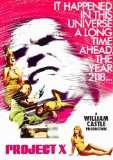| Reviews & Columns |
|
Reviews DVD TV on DVD Blu-ray 4K UHD International DVDs In Theaters Reviews by Studio Video Games Features Collector Series DVDs Easter Egg Database Interviews DVD Talk Radio Feature Articles Columns Anime Talk DVD Savant Horror DVDs The M.O.D. Squad Art House HD Talk Silent DVD
|
DVD Talk Forum |
|
|
| Resources |
|
DVD Price Search Customer Service #'s RCE Info Links |
|
Columns
|
|
|
Project X (1968)
It wouldn't really be a William Castle movie if it wasn't a little goofy, but like so many of his projects...there's a weird fascination to it. Olive Films, purveyor of all those fun Paramount library titles, has released Project X, the 1968 sci-fi espionage thriller from producer/director Castle, based on two novels by British author L.P. Davies, and starring Christopher George, Henry Jones, Harold Gould, Monte Markham, Greta Baldwin, Phillip Pine, and Lee Delano. A strange mixture of science fiction, action thriller, spy flick and...cartoon, Project X will probably make some newer viewers snicker at its 60s approximation of "the future," along with those special visual effects courtesy of Saturday morning toon-meisters Hanna-Barbera. However, there are some interesting ideas floating around here, and like almost all of showman Castle's movies, Project X is, first and foremost, entertaining. No extras for this sharp-looking widescreen transfer.
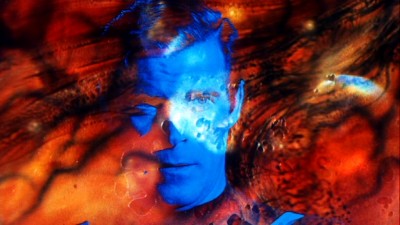
America, 2113. Secret agent Hagen Arnold (Christopher George), back from a mission behind enemy lines in Sino-Asia, has been cryogenically frozen, his conscious mind wiped clean by a serum that was triggered by extreme pain (the psycho-neural equivalent of a cyanide capsule, should he fall into enemy hands). Military commander Colonel Holt (Harold Gould) demands that Dr. Crowther (Henry Jones) reverse the process to discover what, exactly, was the meaning of Arnold's last recorded message: "the West will be destroyed in 14 days." A dubious Dr. Crowther admits they might be able to plumb Arnold's subconscious through laser pictographs via hologram "therapy," where Arnold's subconscious, during drugged sleep, might be viewed as one watches a TV program. Crowther's team, Lee Craig (Phillip Pine), Dr. Tony Verity (Lee Delano), Robert Cleaves (Dr. George Tarvin), and Sybil Dennis (Sheila Bartold), determine that in order for the experiment to work, a new "matrix" of personality must be grafted onto blank slate Arnold, with a fear-inducing catalyst, structured by a past time frame familiar to geneticist/historian Arnold, utilized to keep Arnold in one spot, while scaring his subconscious into revealing his dreams (got that?). So an elaborate 1960s rural farmhouse is constructed, and Arnold is made to believe he's a bank robber on the run from the cops, with Crowther and the science team his cohorts. As the countdown to fourteen days continues, Crowther and company try to sift through Arnold's memories to recreate what happened to him in Sino-Asia, while keeping Arnold down on the farm―tough to do when hot-to-procreate Karen Summers (Greta Baldwin) happens along, and then thought-to-be-dead agent Gregory Gallea (Monte Markham) shows up with a laser gun.
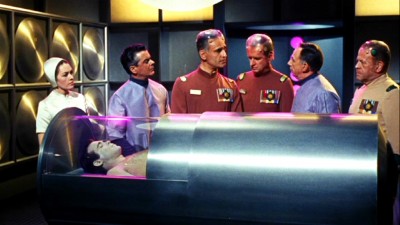
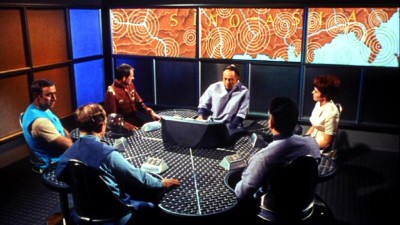
I don't think I was too fond of Project X when I reviewed it for my spy book years and years ago, but it seems to play a whole lot better now (a weak excuse, but by that point in my research, after watching 100s and 100s of espionage movies, I was pretty grumpy, anyway). Project X is the kind of movie that some critics like to come to, snicker at the ready, because of facile assumptions about the filmmaker's reputation or the time period in which it was produced. If Project X has cheap set decoration approximating a naïve 1960s view of the "future," and it's directed by the man who gave you gimmicks like "Emerg-O" and "Percept-O" and "Illusion-O"...then it must be a goof, right? Well...maybe, in its own right, but I get uneasy when I read critics jumping to simplistic conclusions based more on time period rather than context ("Oh, those cheesy sixties!"―I despise that word). I can guarantee that future audiences forty years from now (if they're still human and not giant cockroaches) are going to laugh at many of the so-called "brilliant" contemporary movies these same critics crap themselves over today.
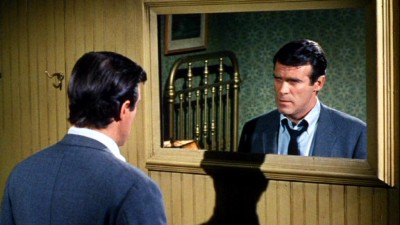
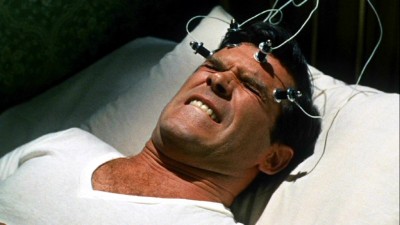
Not that I'm setting up a hypothesis that Project X is a masterpiece, mind you. It most certainly isn't. However, it is entertaining and surprisingly thought-provoking for the very reasons that some newer viewers and critics might sneer at it. Not only do I not care if the "future" looks like bad jumpsuits and chintzy, geometric wallboard panels and giant suppository capsules and a thoroughly familiar studio back-lot ranch house...I love that the "future" looks like bad jumpsuits and chintzy, geometric wallboard panels and giant suppository capsules and a thoroughly familiar studio back-lot ranch house. I don't need William Castle to give me 2001: A Space Odyssey. I can get that from Kubrick. Of course there are lapses in the movie's logic―it's science fiction (here come the emails...). I don't care that when the scientists view Arnold's subconscious, they only get the images and memories that they conveniently need...and not random shots of boy genius Arnold showing up at high school in his underwear (that's what I always dream about) or remembering a picnic in the park, or Lynda Day George nude (oh please god). So what if the scientists make a big deal, a la 36 Hours with James Garner, that everything in the recreated environment must be perfect, down to the smallest detail, or else Arnold will know that it's all a phony set up...and a day later he meets a space lady and has a ray gun fired at him, and he seems to be okay with it? Sure it's improbable and maybe even stupid, but it doesn't insult my intelligence because I'm not coming to Project X looking for a PhD class in Laser Hologram Therapy and Cryogenics, and the Ethical Dilemma of Their Use. I just need an entertaining trip with a few ideas thrown in as bonuses to make Project X work for me, to be worthwhile.
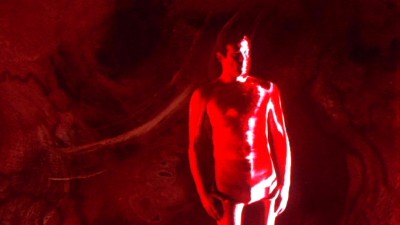
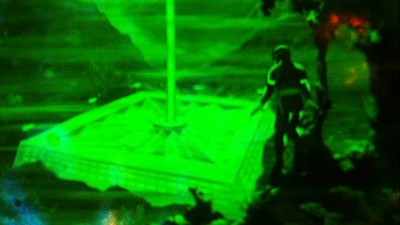
I haven't read L.P. Davies' books, so I can't speak to how many of his ideas wound up in Project X, but there are intriguing little noodles throughout the movie, the most interesting one being how the whole film seems to be predicated on a lie: this "future" world is worth saving from the Sinoese foes who oppose it. Because what kind of life do the characters in Project X live? If you're lucky, you can be like Karen (what's up with the way Greta Baldwin talks? Is it an accent? Oral surgery?), who's "allowed" to have two babies when the government dictates she should, and who works for the government in an antiseptic dairy, where workers sleep on metal slabs like corpses in the morgue, and have sci-fi Flying Nun mother superiors giving them crap for sneaking off for a smoke with a good-looking guy. Or you can be like former agent Stover (Patrick Wright) or Arnold: completely "artificial" men who are nothing more than automatons, programmed and re-programmed like walking, talking DVRs according to the needs of the scientists (who answer to the military). What has the "future" gained from a Western civilization that has eradicated the evils of violence and strife shown in the period newsreels the team watches from a 150 years ago? Man has gained the right to have his mind washed and rinsed (and repeat) anytime the government says so. SPOILER ALERT!Did anyone ask Arnold if he wanted a new identity and marriage to Karen at the movie's end ("It's all perfectly legal!" Dr. Crowther leers to already-ovulating Karen)? No? Well, that's because he doesn't really exist. Who needs his permission? Over-population doesn't threaten the Earth, it's "overproduction of people," according to Crowther, with Arnold's original mission in Sino-Asia being to find out if the Sinoese are "producing" male children only (you only have to look at our own first tentative steps towards genetic engineering and test-tube babies to see how we could fall right in line with this plot point). And while we're at it: I don't buy that Project X is "racist" because the "foe" is Sino-Asia. If "too many people" is the crux of the story's conflict, it makes perfect sense in 1968 to cast China in that role (what, it should have been Liechtenstein?). No one references Sino-Asia as their enemy because of their race, and indeed, when Sen Chiu (Keye Luke), the leader of Sino-Asia, makes an appearance in Arnold's dream, he's aware―and deeply ironic―about how ultimately, race has nothing to do with their struggle (that's why he makes the cynical "inscrutable" joke). Project X wants us to worry if Crowther and his team can get the information to save the West within 14 days, but if that "future" is looked at closely, one would have to wonder, "Why bother?"
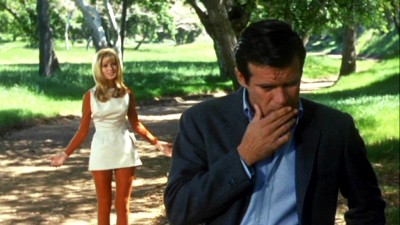
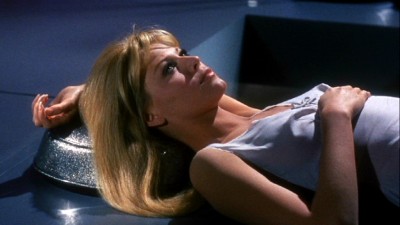
I can't say for sure if Castle intended Project X to make you think as much as be entertained (I'd feel pretty confident betting not, though...), but entertaining it is, with that strange, sometimes inexplicable pull that Castle could manage with his movies (his masterpiece, if you will, House on Haunted Hill, has so many unerringly "right" shots and scenes, such a pervasively confident tone, that it should have a rep entirely different than the rather superficial one it possesses now). Now don't get me wrong; I think Polanski's work on Rosemary's Baby was flat-out brilliant...but am I the only one who would have liked to see Castle's version, too? I don't know if it was deliberate or just blind luck, but in Project X, like quite a few of his movies, there's this strange, coolly observant...distance to his viewpoint that I find fascinating, and one that suits laid-back Christopher George, here, to a T (the best example of this feel is in Castle's voyeuristic treat, I Saw What You Did). I don't see it as a drawback that Project X can be talky and set-bound; I find it weirdly hypnotic that the whole movie seems to be focused on people talking about watching Christopher George dream.
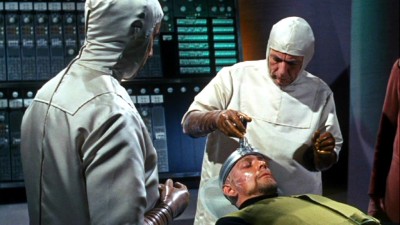

And all the kitschy 60s stuff that others latch onto as damning evidence that Project X is hopelessly "cheesy" (oh god that word again...), I love. Am I crazy or is the interior of the ranch house―especially the hallway and the kichen―the redressed apartment set for Paramount's The Odd Couple movie? Check out the first newspaper headline when the team is researching the 1960s: "Man Stabs Wife: First New Year's Resolution He Ever Kept." During the operation on Monte Markham, Henry Jones (an absolute delight, as always) is dressed exactly like Gale Sondergaard during the operation scene in Abbott & Costello Meet Frankenstein (and do they put the brain in a giant plastic terrarium?). Check out the "all-skate" flourish during the opening credits, when "Organ by Lowrey" flashes. Are those giant clear plastic Leggs® pantyhose eggs on the military men's heads? And how about those convenient spare tissue and cell storage drawers for the cryogenically resting corpses―like a futuristic Mr. Potato Head® Auto-mat! As for the Hanna-Barbera psychedelic head-trip animated sequences...how can you find fault with them? Who cares if you can spot a Jonny Quest lift? It's supposed to be a visual representation of George's subconscious―that means it has to look like 70mm Ultra Panavision? It can't look like a comic book come to life? Of course it's cheap-looking...but it's wonderfully, colorfully, naively straight-faced cheap-looking, and it works, because it doesn't look like anything else in science-fiction movies at that time―just like the same year's 2001: A Space Odyssey didn't look like anything else. They're both valid, in context, regardless of budget, or "vision." Or "art," whatever that is.
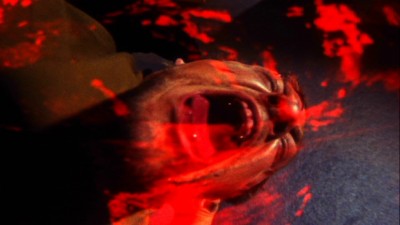
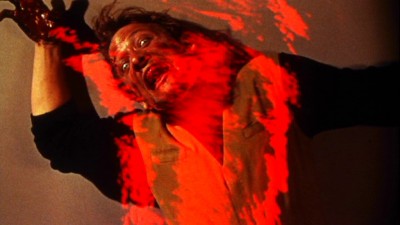
The DVD:
The Video:
The anamorphically enhanced, 1.85:1 widescreen transfer for Project X looks terrific, with saturated color, a sharp image, some grain (as expected), and no compression issues.
The Audio:
The Dolby Digital English split mono audio track is fine, with low hiss and clean dialogue. No subtitles or closed-captions.
The Extras:
No extras for Project X, unfortunately (I would have liked to see the trailer, to see how Castle sold this).
Final Thoughts:
A typically entertaining Castle entry: slighty goofy, yes...but undeniably intriguing. I like precisely what others don't about it. I'm highly recommending Project X.
Paul Mavis is an internationally published movie and television historian, a member of the Online Film Critics Society, and the author of The Espionage Filmography.


|
| Popular Reviews |
| Sponsored Links |
|
|
| Sponsored Links |
|
|
| Release List | Reviews | Shop | Newsletter | Forum | DVD Giveaways | Blu-Ray | Advertise |
|
Copyright 2024 DVDTalk.com All Rights Reserved. Legal Info, Privacy Policy, Terms of Use,
Manage Preferences,
Your Privacy Choices | |||||||









